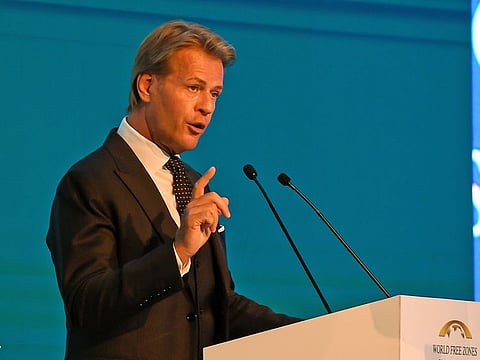Nearshoring is the new reality in international trade, says head of global free zones body
Experts discuss ways of building an ecosystem of trust at annual conference in Dubai

In the current post-pandemic period of ‘de-globalisation’, value chains are being redefined and transformed from global to regional, seeking proximity to suppliers and consumers, said Dr Mohammed Al Zarooni, Chairman of the World Free Zones Organisation (World FZO).
Speaking at the opening ceremony of the organisation’s 9th Annual International Conference & Exhibition (AICE) in Dubai on Tuesday, he said nearshoring is the new reality in international trade.
The place of production of new renewable energies will largely determine the location of those industries for which energy is an essential raw material, he said, adding that free trade zones have become the new production sites for sustainable industries that are dependent on renewable energy sources such as solar and hydrogen, which will be widely used.
Dr Al Zarooni also said cross-border e-commerce is becoming increasingly significant in today’s world and its contribution to global trade is set to go up remarkably in the coming years. Pointing out that the share of cross-border e-commerce in international trade will rise from 20 per cent today to 35 per cent in the next five years, Dr Al Zarooni also stressed the growing importance of digitalisation in international trade.
“The digitalisation of processes and services as well as the virtualisation of telecommunications has made data centres and information storage and transmission the fastest growing sector in international trade, exceeding $3.8 trillion last year, and representing 55 per cent of global trade and services,” he said.
Speaking at the event, Martin G. Pedersen, Chairman of Dubai-based IFZA, said the role of a free zone has never been more crucial than it is today. As facilitators and multipliers of opportunity, free zones must ensure they have the agility and sharp decision-making needed in times of great change, he said.
“We need to stay ahead of the game to constantly look to the new and the next to see what opportunities are on the horizon and to take advantage of them just like any successful entrepreneur,” Pedersen said.
Adding that embracing a global outlook and openness for remote cooperation is more important now than ever, the IFZA chief also said Dubai and its free zones have a huge opportunity ahead as global governments look to nurture and mature their artificial intelligence sectors and businesses look for the best possible location in which to develop and grow their industries.
He said AI is estimated to contribute up to $16 trillion to the global economy by 2030. “This is more than China’s and India’s current output combined,” Pedersen pointed out, putting things into perspective.
Earlier on the opening day, leading experts from the industry held an in-depth discussion on the theme of this year’s event, ‘An Ecosystem of Trust Driving Prosperity’. Moderating the discussion, Lars Karlsson, Global Head of Trade and Customs Consulting at Maersk, said for Global Trade 2.0 to effectively build an ecosystem of trust, it is important to focus on standardisation, digitalisation, and risk and compliance management.
While agreeing that these three aspects are key to building trust, Ricardo Treviño Chapa, Deputy Secretary-General of the World Customs Organisation, said digitalisation is much more than turning paper documents into digital documents. Stressing that changing from paper to PDF is not digitalising, he said we should “migrate from this mindset and this culture of document-based procedures to data-driven procedures and data-driven decisions”. He added that to achieve this and to build trust, free zones, customs administrations, and other stakeholders in trade will have to work together.
Sign up for the Daily Briefing
Get the latest news and updates straight to your inbox


